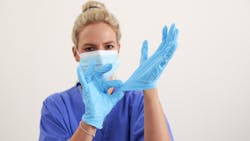Myth busters for dental assistants: Wearing those ‘stupid’ utility gloves
I don’t have to wear those stupid, heavy utility gloves. They’re the worst! Right? Wrong!
I find it crazy when I read posts on social media that ask questions like this one. Wearing those gloves is a CDC and OSHA thing, and the rule is in place for a reason. Yet you will find all kinds of answers on social media, and only a few of them are correct. Most people who share wrong advice truly believe they know the correct answers.
Let’s look at some of the things—gloves, fans in the op, and instrument transport—that people in our profession are confused about.
About those gloves—the Centers for Disease Control and Prevention (CDC) says, “The person handling the instruments through removal, cleaning, packaging, and sterilization needs to use heavy-duty gloves to help prevent injury with sharp contaminated instruments.”
Is it hard? Yes! Will you get used to them? Yes! Do they really help prevent needle sticks? Yes, because they must be puncture resistant.
When it gets hot in the op, I can turn up that fan, right?
Not so fast! While I can totally relate to being too hot with all the extra PPE, menopause, and a stressful work environment, using a fan isn’t always the option, and here’s why. We want the fan blowing at our face, but COVID-19 protocols have reinforced that we need to keep aerosols at a minimum. Having a fan transport all those germs contained in the aerosols directly into our faces isn’t exactly what the CDC or OSHA want.
So, using a fan as a coolant isn’t a great idea. Try wearing thinner clothing under your PPE. The PPE is there to protect us, but what you wear under it is your choice, so choose wisely (and coolly)! Years ago in my first office, my doctor would come in each day, remove his shirt, and put on his smock. Now, I’m not suggesting your get naked under all that PPE, but use your discretion and think about what you wear, and try to keep it light.
Transporting instruments from operatory to sterilization area
I recently saw a question on social media about how to transport instruments from the room to the sterilization area. There were many answers, with people saying they just put them on a tray, cover it with plastic, transport them in a cassette, and other idea. None of those are acceptable with OSHA, which has this to say: “Immediately or as soon as possible after use, contaminated reusable sharps shall be placed in appropriate containers until properly reprocessed. These containers shall be: (a) puncture resistant, (b) labeled or color-coded in accordance with this standard, (d) leak-proof on the sides and bottom, and (d) in accordance with the requirements set forth in paragraph (d)(4)(ii)(E) for reusable sharps.”
“Reusable sharps” means instruments. None of those fit the criteria outlined in the paragraph above. Be sure you either label the tub or use a color coded tub, which is my preference.
So what does it all mean?
Why do you make your children wear seat belts? To protect them. So, why don’t you protect yourself? There’s too much going on in this world not to follow the rules and do what you know is right! Don’t you have the right to be served food in a healthy and safe restaurant? Of course you do! Don’t our patients have the right to be treated with the utmost respect, care, and best practices we have available? You bet they do, and that starts with you!
About the Author

Tija Hunter, CDA, EFDA
Tija Hunter, CDA, CDIA, CDIPC, CDSH, CDSO, EFDA, MADAA, is a member and former vice president of the American Dental Assistants Association (ADAA), where she holds the honor of Master. She is the director of the Dental Careers Institute, a dental assisting and dental continuing education program, and the author of seven continuing education study courses. She is an international speaker and a certified trainer in nitrous oxide in several states. She can be reached at [email protected].
